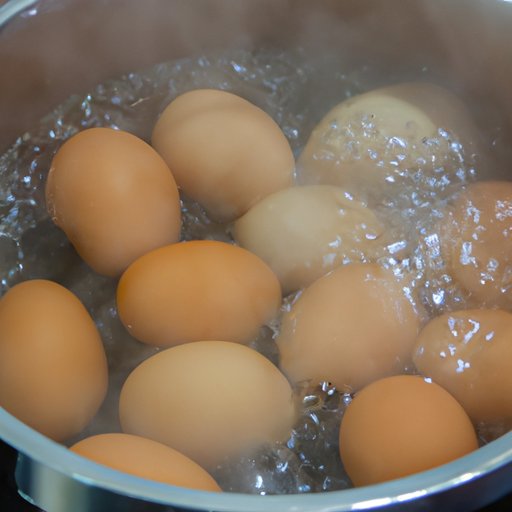
Introduction
Boiling eggs is a simple task that most of us are familiar with. However, getting the perfect boiled eggs is not as easy as it seems. Boiling eggs for the right amount of time can be a challenge, especially when you want to get the perfect consistency. Whether you want soft, medium, or hard boiled eggs, there are certain things you need to keep in mind to achieve your desired result. In this comprehensive guide, we will explore how long you really need to boil eggs to get the perfect results.
Basic Steps for Perfectly Boiled Eggs: A Step by Step Guide
Before diving into the details of how long you should boil eggs for different results, let’s start with the basic steps for boiling eggs.
To start, you will need a pot, a timer, water, and eggs. Fill the pot with enough water to cover the eggs by at least an inch. Next, add a teaspoon of salt or vinegar to the pot. This helps the eggs to peel easily.
Place the pot on the stove over high heat and bring it to a boil. Once the water is boiling, use a spoon to gently place the eggs into the pot. Lower the heat to a simmer and start your timer.
The timing is vital for the perfect boiled eggs, so make sure to keep an eye on your timer.
The Science Behind Boiling Eggs: How Long is Too Long?
To understand how long you need to boil eggs, it’s essential to understand the science behind boiling eggs and how it affects their doneness.
An egg has three main parts: the shell, the white, and the yolk. The egg’s anatomy plays a significant role in determining how long you need to boil it.
The egg white is 90% water and 10% protein. As it heats up, the proteins start to denature and coagulate, causing the egg white to go from liquid to solid. The yolk contains fats and proteins, and it takes longer than the white to cook.
The longer you boil eggs, the tougher and drier they become. Overcooking eggs can also result in a greyish-green color around the yolk, which is not visually appealing.
The perfect boiled egg should have a runny yolk in the center and a set white all around it.
How to Boil Eggs for Soft, Medium, and Hard Boiled Eggs
Now that you understand the science behind boiling eggs let’s discuss how to boil the perfect eggs for each preference.
Soft-boiled eggs have a runny yolk but set whites. To achieve this, boil medium-sized eggs for 4-5 minutes. If you desire medium boiled eggs with a slightly gooey yolk, boil for 6-8 minutes. For hard-boiled eggs with a fully cooked yolk, boil for 9-12 minutes.
It’s essential to note that the boiling time may vary depending on the egg size, altitude, and starting temperature. Larger eggs will require longer boiling times, while eggs taken directly from the fridge will require more time than room temperature eggs.
Different Factors Affecting Boiling Times of Eggs
As mentioned earlier, various factors contribute to the boiling time of eggs. By understanding them, you can adjust the boiling time for the perfect results every time.
Egg Size: The size of the egg affects the boiling time. Large eggs will require more time to get cooked than small eggs.
Altitude: If you are living at high altitudes, the boiling time of the eggs will increase. This is because water boils at a lower temperature at high altitudes.
Starting Temperature: If the eggs are taken straight from the refrigerator, they will require more time to cook. However, if they are at room temperature, they will cook faster. It’s essential to start with room temperature eggs for the perfect boiled eggs.
Tips and Tricks for the Perfect Boiled Eggs Every Time
Here are some tips and tricks to achieve the perfect boiled eggs every time:
Peeling: To make peeling easier, crack the shell on both ends and roll the egg gently on a hard surface before peeling.
Storing: Hard-boiled eggs can be stored in the fridge for up to a week. Keep them in a covered container to prevent odor absorption.
Reheating: If you want to reheat boiled eggs, it’s best to put them in cold water and bring the water to a simmer.
Common Mistakes: Avoid overcooking your eggs and leaving them in the pot for too long. This can result in rubbery eggs.
Experimentation and Personalization: Don’t be afraid to experiment with different spices and flavors to get unique boiled egg recipes.
Conclusion
Boiling eggs is a simple task, but getting the perfect consistency can be challenging. Hopefully, this comprehensive guide provided you with an understanding of the science behind boiling eggs and how to achieve the perfect boiled eggs every time. Remember to keep an eye on your timer and to adjust the boiling time for factors such as egg size, altitude, and starting temperature. With practice and observation, you will master the art of boiling eggs perfectly every time.




